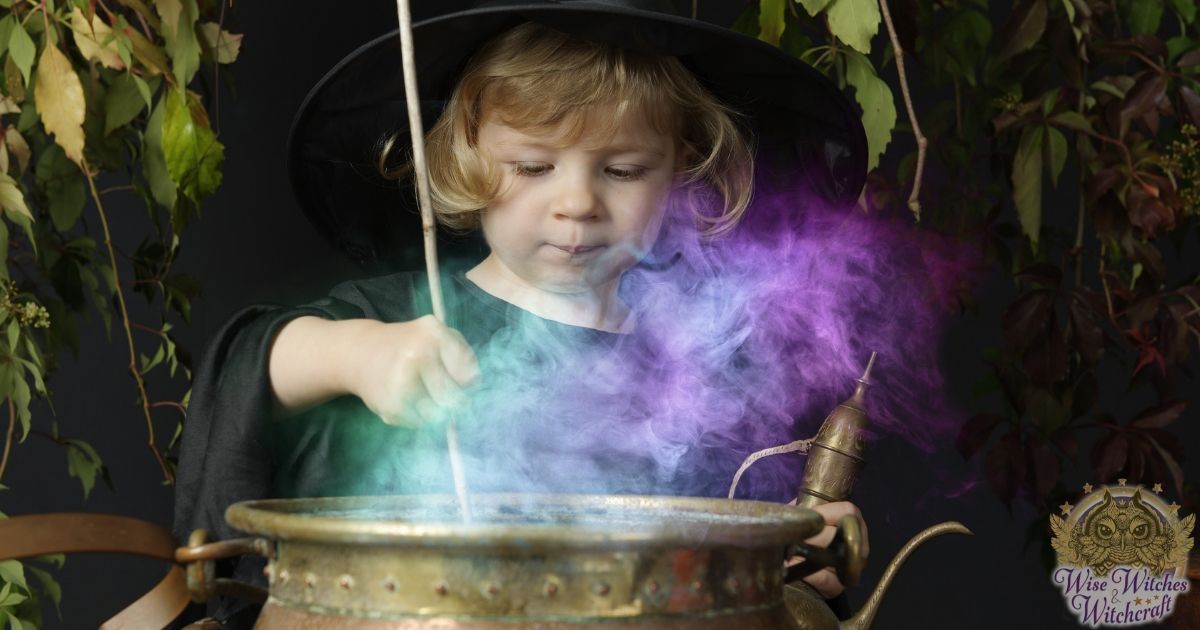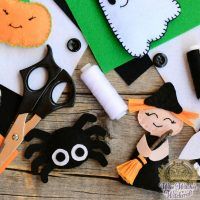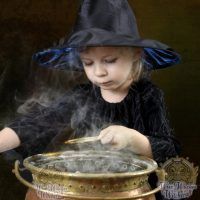The Pagan Child’s Pantry

How our hearts would transform if we allowed ourselves to reach out for something invisible, to respect and honor the inexplicable. Children get it. Little people have an inherent ability to see magic wherever it is available (and it is available everywhere)—but as we age, we trade wonder for logic, and we relinquish inspired, reckless belief for practicality.”
– Carlie L. Edmind
Neo-paganism has grown up. Over the past several decades our families have grown. Many of us have children who are involved in a metaphysical path, and others have children who are interested in magick. That’s perfectly normal, but it leaves parents with various struggles including how to share our faith without being dogmatic or manipulative.
The wonderful thing about the sacred kitchen is that at nearly any age a child can pour a cup, stir with a spoon, etc. Better still, the ideas and tools grow with the child and parents alike. While the child’s engaged in cooking, parents can slip in a story or two that imparts a lesson or a family tradition; this is a very old and venerable way of teaching, and better still it has a wonderful outcome – dinner is served!
Any Excuse to Cook

An occupational hazard of being a Kitchen Witch is the overwhelming temptation to turn every situation into an excuse for cooking. When those situations arise, any children in the house seem to gravitate to the kitchen (and a few adults too!). Once there, they want to help! Let’s face it, getting your fingers into food preparation is nearly as fun as mud pies! In this setting it’s not only “ok” for kids to play with their food – it’s mandatory.
The Sacred Hearth
Our ancestors felt the hearth (stove) was the heart of the home. With that in mind, it’s no wonder that our ancestors sat at the kitchen table reviewing school lessons, teaching family crafts, etc. They realized that the loving, warm atmosphere of the kitchen created a comfort zone. Also, hands engaged in enjoyable activities leave an open mind. Cook up a good story, and you can bet the children listen. Tell them of the Old Gods. Or share with them a tale about your grandmother’s magical herb garden: This isn’t a matter of great skill, but rather intent and spending quality time together.
Magical Pantry Practices

Because hearth magic has numerous simple elements, it’s something conveyed easily to children. Consider stirring clockwise while you cook. If you watch, your child probably does this quite naturally: This might provide an opportunity for making a wish while whipping up that positive energy.
Stove-side Wish Incantation
Round and round to the right
I wish I may, I wish I might
Stir the magic, the happy kind
In this spell, my wish I bind.
The child can substitute other words for happy like healthy, lucky, etc. so it better reflects the basic wish.
There are certainly other everyday-pantry practices to which you can add a little magic for your children. How about cleaning as you go? You could have them help you make a special herbal solution for the chore while teaching them about each ingredient’s role in the blend.
Another thought would be using seasonal holiday decorations. Have the child help pick out the adornments (or, better, make some). While you work together, you can tell them about the meaning of the holiday. Don’t forget any personal or family customs! They’re just as important and have a magic all their own.
The Pagan Pantry Outside the Home

Your educational efforts need not remain in your kitchen. Pantry magic easily fits into a lot of places. Pick your own farms comes to mind. What a great way to get the family outdoors, harvest fresh food and share a spell or two.
Berry Blessings and Apple Delight
For example, what if you’re picking berries. These symbolize kindness, love, plenty and blessings. So while you gather up your treasures teach the kids a little ditty like:
Berries come with me and bless
Fill my home with happiness!
What about picking apples? This fruit symbolizes the Goddess in many cultures. So, how about a charm like:
I reach up high, into the sky
The Lady lives up there
She tends the apples and watches the trees
My apples fill with Goddess glee!
Okay, so it’s not great poetry. Really it’s probably better that way. Children have a short attention span. They rhyme makes the charm easily remembered. Keeping it short is also advantageous. It won’t take long before the child remembers the words, and may actually sing them to his or her own tune.
Our children brim with magic. All you’re doing is using your pantry for a little inspiration.
Adapted from “Wicca 2000,” by Patricia Telesco. All rights reserved.




